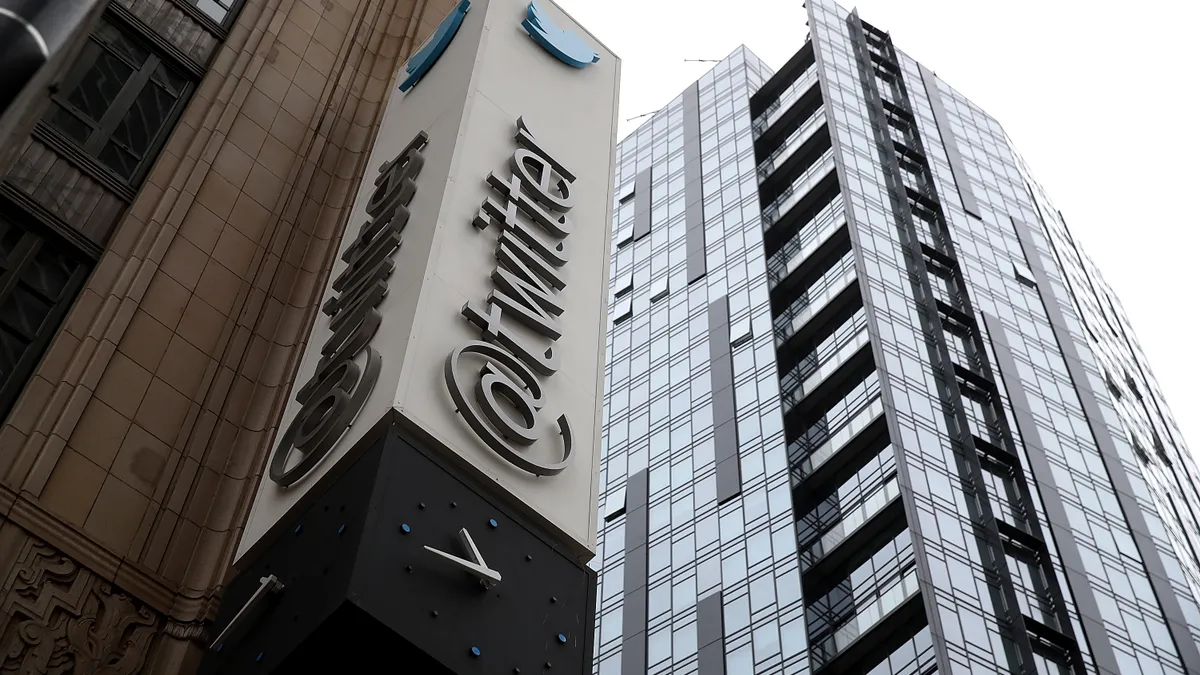Dive Brief:
- Twitter CFO Ned Segal and CEO Parag Agrawal retweeted Twitter Board Chairman Bret Taylor’s Friday message that the board was gearing up to go to court to close its $44 billion merger agreement with Elon Musk, suggesting the C-suite executives are closing ranks on forcing Musk to complete the deal.
- “The Twitter Board is committed to closing the transaction on the price and terms agreed upon with Mr. Musk and plans to pursue legal action to enforce the merger agreement. We are confident we will prevail in the Delaware Court of Chancery,” Taylor, who is also co-CEO of Salesforce, tweeted, echoing the company’s press release.
- The tweets came after a lawyer stated in a letter included in a Friday filing that Musk was “terminating” the agreement, asserting the company was in “material breach” of multiple provisions of it.
Dive Insight:
Musk has been agitating for some time about the deal. Roughly two months ago the billionaire said he was putting it on hold, pending details on the social media giant’s numbers related to spam and fake accounts.
A Friday letter to Twitter’s chief legal officer, Vijaya Gadde, from Mike Ringler of Skadden, Arps, Slate, Meagher & Flom, detailed Musk’s team’s efforts to obtain information on the platform’s number of spam or false accounts “as far back as May 9, 2022.” The letter was made public in a filing.
It states that Twitter has not yet provided complete information to enable Musk to do a comprehensive review of the accounts and asserts that it “appears that Twitter is dramatically understating the proportion of spam and false accounts.”
Twitter, in a May 2 filing, stated it had performed an internal review of a sample of accounts and estimated that the average number of false or spam accounts during the first quarter of 2022 represented fewer than 5% of its magnetizable daily active usage or users (mDAU). Twitter defines the metric as a measure of people, organizations or other accounts who logged in or were otherwise authenticated and accessed Twitter on any given day through twitter.com, Twitter applications, or paid Twitter products.
Musk’s lawyer’s letter also said that Twitter, in taking such steps as announcing on July 7 that it was laying off a third of its talent acquisition team, did not comply with its obligations under the merger agreement to obtain consent before deviating from its obligation “to preserve substantially intact the material components of its current business organization.”
The San Francisco-based company issued a response in a press release Friday stating it had “received a notice of purported termination from Elon Musk.” The short release also included a two-sentence statement from the Twitter board that mirrored Taylor’s tweet.
Experts have differed as to whether Segal is likely to remain at Twitter’s finance helm if Musk does end up completing his takeover. Meanwhile, what is clear is that Segal is in the kind of difficult position that financial chiefs often find themselves in during takeover transactions.
CFOs in buyout scenarios are typically tasked with providing much of the financial data required for deal financing and how they provide that can shape how or if a deal gets done, Steven Siesser, a partner and co-chair of the transactions and advisory group at the law firm Lowenstein Sandler, previously told CFO Dive.
At the same time, the CFO must keep in mind that the deal is not closed until it is, Siesser said. Until then, “You have to walk a fine line of not alienating the buyer and not alienating the seller,” he said.












